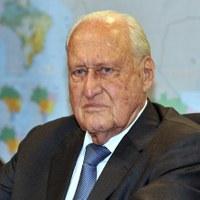Rio de Janeiro (Brasil), 1916 – 2016
By Pablo Alabarces
Of Belgian origin, Jean Marie Faustin Godefroid Havelange dedicated most of his life to sports, both as an athlete and an executive. He competed twice in the Olympic Games, first as a swimmer in 1936 and later as a member of the water polo team in 1952. He subsequently served as head of the Brazilian delegation at the Melbourne Games in 1956. He received numerous honors for his services to sports, including the title of Knight of the Legion of Honor (France), the Order of Special Merit in Sports (Brazil), and the Grand Cross of Isabella the Catholic (Spain). He was elected president of FIFA, succeeding Sir Stanley Rous in 1974, becoming the first Latin American to lead the organization. After five successive re-elections, he left the position in 1998, appointing Joseph Blatter as his successor.
Among the most important actions of FIFA under the Brazilian’s leadership was the expansion of the World Cup teams from 16 to 24 (in Spain, 1982) and later to 32 (in France, 1998). In addition, under Havelange’s command, FIFA created youth world championships in 1977 (for players under twenty) and the U-17 championship in 1985. He also promoted the development of women’s football and futsal competitions. In the 1970s, Havelange established football development programs in Third World countries. The strong performances of African and Asian teams in the World Cup demonstrate the success of these efforts. In 1988, he was nominated for the Nobel Peace Prize. However, there were suspicions of corruption during his leadership of FIFA, which consistently prioritized commercial success over sports ethics.
Havelange’s presidency of FIFA coincided with the period when football exploded as a global business. In 1978, he supported holding the World Cup in Argentina despite the presence of the military dictatorship in the country, and he was suspected of supporting the illicit dealings of Argentine Rear Admiral Carlos Alberto Lacoste, whom he later appointed FIFA vice president. In 1993, he had a major dispute with Pelé, after the Brazilian former player denounced corruption in the Brazilian Football Confederation (headed by Ricardo Teixeira, Havelange’s son-in-law). For this reason, he banned the greatest idol in Brazilian football history from participating in the 1994 World Cup draw. Havelange is a shareholder of Viação Cometa, one of the three largest bus companies in Brazil, and the chemical company ORWEC.
In 2011, he resigned from his position as a member of the International Olympic Committee (IOC) to avoid the conclusion of investigations linking his name to the bribery scandal involving the sports marketing agency ISL. In 2013, for the same reason, he resigned from his position as FIFA honorary president.



